LT1959IR#TRPBF Linear Technology, LT1959IR#TRPBF Datasheet - Page 18

LT1959IR#TRPBF
Manufacturer Part Number
LT1959IR#TRPBF
Description
IC SW REG STEPDN 500KHZ 7DD
Manufacturer
Linear Technology
Type
Step-Down (Buck)r
Datasheet
1.LT1959CS8PBF.pdf
(24 pages)
Specifications of LT1959IR#TRPBF
Internal Switch(s)
Yes
Synchronous Rectifier
No
Number Of Outputs
1
Voltage - Output
1.21 ~ 38 V
Current - Output
4.5A
Frequency - Switching
500kHz
Voltage - Input
4.3 ~ 15 V
Operating Temperature
-40°C ~ 125°C
Mounting Type
Surface Mount
Package / Case
D²Pak, TO-263 (7 leads + tab)
Lead Free Status / RoHS Status
Lead free / RoHS Compliant
Power - Output
-
Available stocks
Company
Part Number
Manufacturer
Quantity
Price
LT1959
APPLICATIONS
formulas show how to calculate each of these losses.
These formulas assume continuous mode operation, so
they should not be used for calculating efficiency at light
load currents.
Switch loss:
Boost current loss:
Quiescent current loss:
R
24ns = Equivalent switch current/voltage overlap time
f = Switch frequency
Example: with V
Total power dissipation is 0.68 + 0.15 + 0.04 = 0.87W.
Thermal resistance for LT1959 package is influenced by
the presence of internal or backside planes. With a full
plane under the SO package, thermal resistance will be
about 80 C/W. No plane will increase resistance to about
120 C/W. To calculate die temperature, use the proper
thermal resistance number for the desired package and
add in worst-case ambient temperature:
18
P
P
P
SW
Q
BOOST
SW
P
P
P
Q
SW
BOOST
= Switch resistance ( 0.07)
10 0 001 5 0 005
0 32
V
0 07 3
.
IN
.
R
.
5
0 001
SW OUT
10
2
V
0 36
10
OUT
3 50
.
I
IN
2
/
= 10V, V
V
2
5
U
IN
V
I
V
OUT
.
2
IN
0 68
OUT
.
V
0 15
INFORMATION
24 10
OUT
/
U
.
W
0 005
50
OUT
•
W
5
= 5V and I
24
2
9
10
0 002
W
ns I
.
3 10 500 10
V
OUT
OUT
OUT
2
V
IN
0 04
V
0 002
= 3A:
.
U
IN
•
W
f
3
With the SO-8 package (
temperature of 50 C,
Die temperature is highest at low input voltage, so use
lowest continuous input operating voltage for thermal
calculations.
FREQUENCY COMPENSATION
Loop frequency compensation of switching regulators
can be a rather complicated problem because the reactive
components used to achieve high efficiency also
introduce multiple poles into the feedback loop. The
inductor and output capacitor on a conventional step-
down converter actually form a resonant tank circuit that
can exhibit peaking and a rapid 180 phase shift at the
resonant frequency. By contrast, the LT1959 uses a “cur-
rent mode” architecture to help alleviate phase shift cre-
ated by the inductor. The basic connections are shown in
Figure 9. Figure 10 shows a Bode plot of the phase and gain
of the power section of the LT1959, measured from the V
pin to the output. Gain is set by the 5.3A/V transconduc-
tance of the LT1959 power section and the effective
complex impedance from output to ground. Gain rolls off
smoothly above the 600Hz pole frequency set by the
100 F output capacitor. Phase drop is limited to about
70 . Phase recovers and gain levels off at the zero fre-
quency ( 16kHz) set by capacitor ESR (0.1 ).
LT1959
GND
T
T
J
J
= T
= 50 + 80 (0.87) = 120 C
CURRENT MODE
A
POWER STAGE
C
g
F
+
m
= 5.3A/V
Figure 9. Model for Loop Response
JA
V
R
C
C
C
(P
C
TOT
)
AMPLIFIER
ERROR
–
+
JA
1.21V
V
= 80 C/W), at an ambient
SW
FB
R1
R2
+
ESR
C1
OUTPUT
1959 F09
C















